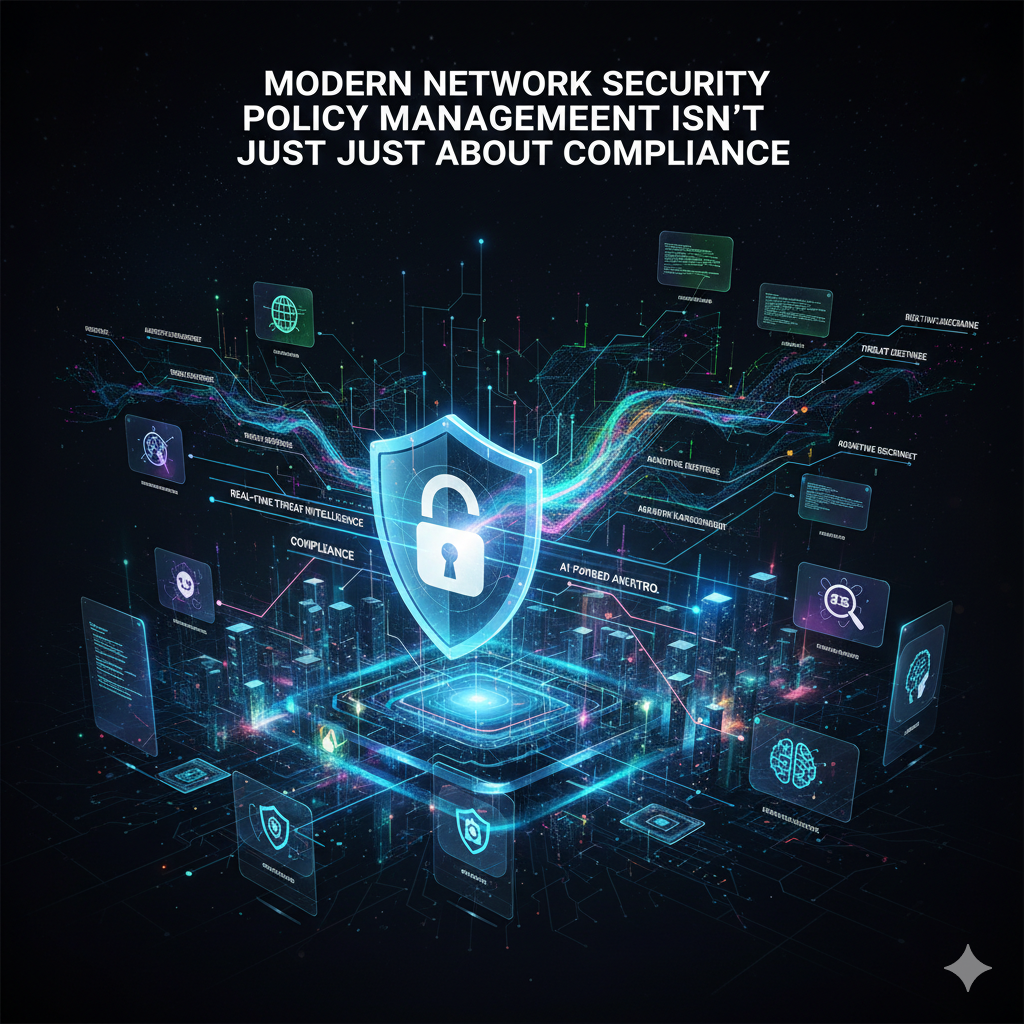NSPM enhances network security’s automation. It has become an integral part of most enterprises.
The cybersecurity sector is a continuous turnover and undoubtedly, Building and maintaining a secure network would be a hard nut to crack. It is because, as companies advance and the networks increase in size, the enforcement of the security governance policies defeats the purpose. To rise to this challenge, a good number of firms are seeking the help of network security automation, which is defined as the innovative use of modern tools to simplify, implement, and manage the security policies of broad and often complex IT environments.
Network Security Policy Management (NSPM) is a process that stands central in network security automation. It is an important solution that ensures the security policies are well-governed, do not compromise on compliance and are always in place irrespective of the threat challenges.
This article defines what is network security automation and goes further to discuss why it is vital for the organizations and how the news about NSPM solutions is changing this vital trend making it an astute weapon for the organizations aiming at securing their information.
What is Network Security Automation?
Automating network security management entails automating the processes of implementing, maintaining, and controlling security policy across the entire network. It makes it possible to manage human labour more efficiently and improve the speed of response to possible threats thereby enhancing the network.
In a classical approach of security management, it is the responsibility of the network administrator to configure access lists, firewalls and other security measures. This approach is slow, error-prone and simply does not work in any effective way in the rapidly changing, cloud based world. By the use of automation, organizations are able to execute these processes in a simplified manner thus making it possible to have systems that are secure but at the same time easy to transform and incorporate new risks and infrastructure changes.
The Role of NSPM in Network Security Automation
Network Security Policy Management (NSPM) plays a central role in network security automation by serving as the core solution that integrates, automates, and manages security policies across the entire network. NSPM solutions provide visibility, control, and automation of security policies across diverse environments, ensuring that the network remains secure and compliant with regulatory standards.
Here’s how NSPM contributes to network security automation:
1. Centralized Management of Security Policies
One of the main benefits of NSPM is the centralization of security policy management. In modern networks, organizations often use multiple firewalls, routers, switches, and cloud infrastructures. Without a centralized system, managing security policies across these different devices and platforms becomes overwhelming and leads to inconsistencies.
NSPM automates the process by providing a unified platform where all security policies can be managed, monitored, and updated from a single interface. This ensures that all devices across the network follow the same security rules, reducing the chances of misconfigurations and security gaps.
2. Policy Consistency and Automation Across Hybrid Environments
Most organizations today operate in hybrid environments that combine on-premises systems, public clouds, and private clouds. Maintaining consistent security policies across these varied environments is a significant challenge, especially when done manually.
NSPM solutions automate the application of security policies across hybrid environments, ensuring that policies are consistent and compliant with internal and external regulations. This consistency is critical in preventing security lapses as traffic moves between different environments. Additionally, NSPM can detect policy conflicts and automatically resolve them, preventing configuration issues that could expose the network to vulnerabilities.
3. Improved Threat Response and Mitigation
Cyberattacks are becoming more sophisticated and frequent, making it essential for organizations to respond quickly to threats. Manual processes slow down incident response times, as IT teams need to assess the issue, locate the vulnerable policy, and manually apply a fix.
NSPM solutions help automate the threat detection and response process. When a threat is detected, NSPM can automatically apply predefined security policies to mitigate the issue. For example, if a vulnerability is found in a particular part of the network, NSPM can automatically block access to that segment, limiting potential damage until the threat is neutralized. This rapid response capability is crucial in minimizing the impact of cyberattacks.
4. Reducing Human Error Through Automation
Human error remains one of the leading causes of security breaches. Manual processes are inherently prone to mistakes—misconfigurations, overlooked updates, or even incorrect rule implementation can open up critical vulnerabilities in the network.
With NSPM, these manual tasks are automated, significantly reducing the risk of human error. Whether it’s updating firewall rules, configuring access control, or implementing new security policies, NSPM ensures these actions are performed accurately and consistently. By automating these tasks, security teams can spend more time focusing on strategic priorities, like threat analysis and incident response, rather than being bogged down by routine configuration tasks.
5. Enhanced Visibility and Reporting
Visibility is a key element of network security automation. Without full visibility into the network, it’s impossible to know whether security policies are being followed, whether there are any gaps, or how data is flowing through the system.
NSPM solutions provide detailed, real-time visibility into the entire network infrastructure, enabling security teams to monitor the effectiveness of security policies, detect anomalies, and perform audits more easily. NSPM tools typically come with advanced reporting features that automate compliance checks and generate detailed reports on policy enforcement and network security status. These reports help organizations meet regulatory requirements while maintaining high standards of security.
6. Ensuring Compliance with Regulatory Standards
Regulatory compliance is a critical concern for businesses across industries, particularly those dealing with sensitive customer data or operating in highly regulated sectors like finance or healthcare. Manually ensuring that network security policies comply with industry standards (such as GDPR, HIPAA, or PCI-DSS) can be daunting and error-prone.
NSPM solutions automate compliance management by continuously monitoring the network for any deviations from regulatory requirements and automatically updating policies to stay in line with the latest standards. This ensures that organizations can maintain compliance without the constant need for manual audits and policy adjustments.
NSPM as a Strategic Investment in Cybersecurity
Over the years, the growth and integration of numerous networks have enhanced business practices. However, the emergence of the public internet warfare has made organizations update how they communicate with and manage their network security. Computer network security management for businesses of all sizes is already appealing.
Investing in Network Security Policy Management (NSPM) for automated network security is a sound investment strategy for the following reasons:
Scalability: The implementation of NSPM solutions assures you that certain improvements will be made to the network without the worrying constraints of the security aspect. By the growth of the organization, otherwise deployed resources will be managed by NSPM allowing settling security definitions automatically.
Cost Efficiency: Security is hampered as NSPM relies on a big base of IT personnel. Once security regular activities are done automatically with routine tasks, the demanding IT section will not be needed sparing security teams to concentrate on value adding tasks, which is cost and time efficient.
Proactive Security: USA DMCC Security companies Palestin polyclinics help take over the threat by once again preventing implementation of security policies after the fact. This is accomplished by using the NSPM modulation, which assists in assigning roles and implementing strategies to reduce the chances of network breach.
Risk Mitigation: Planning plays an important role in every business activity. In this era of digital transformation and the global move to the cloud, there is no denying that NSPM offers protection for the organizations network policy against changes brought about by incorporation of new systems.
How Opinnate Contributes to Network Security Automation
In today’s dynamic cybersecurity landscape, organizations need efficient, intelligent, and automated solutions to manage their firewall policies and security rules. Opinnate Network Security Policy Management (NSPM) is designed to streamline firewall operations, optimize security policies, and automate critical network security processes, reducing manual workload and minimizing risks.
Automated Firewall Rule Management
Opinnate automates firewall rule analysis, identifying redundant, unused, or conflicting rules that may expose networks to vulnerabilities. By providing passive monitoring, Opinnate helps organizations track rule usage in real time and offers actionable recommendations to write more effective, optimized rules. This level of automation ensures security teams can manage complex policies without the risk of human error.
Seamless Compliance & Risk Reduction
Regulatory compliance is a major challenge for enterprises, and manually ensuring firewall policies meet compliance requirements can be tedious. Opinnate simplifies compliance by automating audits, risk assessments, and policy verifications. It ensures security configurations adhere to industry standards and frameworks, reducing compliance gaps and audit failures.
Effortless Integration & Orchestration
Unlike traditional firewall managers, Opinnate does not require additional firewall management tools, making it easy to integrate with multi-vendor environments like Fortinet, Check Point, and Palo Alto Networks. Security teams can implement policy changes faster and enforce consistent security measures across different firewall platforms.
Enhancing Operational Efficiency
Through automation, Opinnate significantly reduces the time required for firewall rule reviews, approvals, and implementation. This allows IT teams to focus on strategic security initiatives rather than repetitive manual tasks.
By combining automation, intelligence, and security policy optimization, Opinnate empowers organizations to achieve stronger security postures with minimal effort, ensuring continuous protection against evolving cyber threats.
In the contemporary business environment, characterized by the dynamics introduced by digital technology, there is no doubt that automating the security of the networks can no longer be an option. NSPM solutions are at the spearhead of such automated managerial approaches, particularly when it comes to the management of security policies for more and more intricate networks. In an environment where there are threats and policies against such threats, NSPM equips organizations with tools and capabilities to ensure that their networks are protected.
For businesses looking to stay competitive and secure, adopting an NSPM-driven approach to network security automation is a must.





